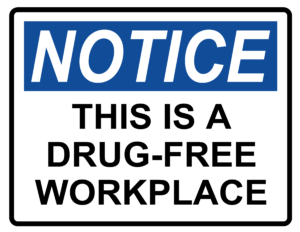
Studies show that when comparing alcohol or drug abusers with drug-free workers , substance abusers are more likely to exhibit one or more of these behaviors:
- • Be far less productive.
- • Miss more workdays.
- • Be injured or injure others on the job.
- • File more workers’ compensation claims.
It is difficult to put a price on low morale and impaired judgment caused by substance abuse or alcohol use on the job. It is also hard to determine the actual cost of on-the-job theft, high turnover, constant recruitment and training of new employees. Add the cost of absenteeism, overtime pay, tardiness, sick leave, insurance claims, and workers’ compensation fees, and the price tag for substance abuse in the workplace can be incredibly high.
No one wants to think that a friend or trusted employee has a substance abuse or drinking problem. The truth is, 10% of the American population has a problem with alcohol; one in twelve has a problem with drugs.
It is no coincidence that the US Department of Transportation was the first government agency to require random drug testing for safety-sensitive workers. Safety and transportation are understandably linked. Passengers do not use transportation they feel is unsafe.
ATA helps Arkansas’s public transit systems and many non-profit human service agencies meet US Department of Transportation regulations regarding the Procedures for Transportation Workplace Drug and Alcohol Testing (49 CFR Part 40). ATA administers two separate DOT consortiums: one that complies with federal regulations for public transit systems (FTA: 49 CFR Part 655), and another for agencies with commercial motor vehicles (FMCSA: 49 CFR Part 382). At the request of many members, ATA also provides a non-DOT testing program.
Testing is required by the Federal Transit Administration and the Federal Motor Carrier Safety Administration. Employees not regulated by the Department of Transportation are tested under their own consortium. Group purchasing by the consortiums results in lower costs and superior customer service.
For more information, please contact our office at (501) 372-8900
Online Resources
FMCSA Drug & Alcohol Clearinghouse
Drug Free Workplace Act of 1988
Drug & Alcohol Information (SAMHSA)
USDOT Office of Drug & Alcohol Policy & Compliance
List of Substance Abuse Professionals
Drug and Alcohol Testing Industry Association
Substance Abuse Program Administrators Association
ADA AND FTA Regulations and Guidance
Title VI of Civil Rights Act of 1964
ADA Paratransit Eligibility Guide From Disability Rights Education and Defense Fund
Arkansas Transit Association
Advancing public transportation in Arkansas through education, technical assistance and training.
Contact Us
